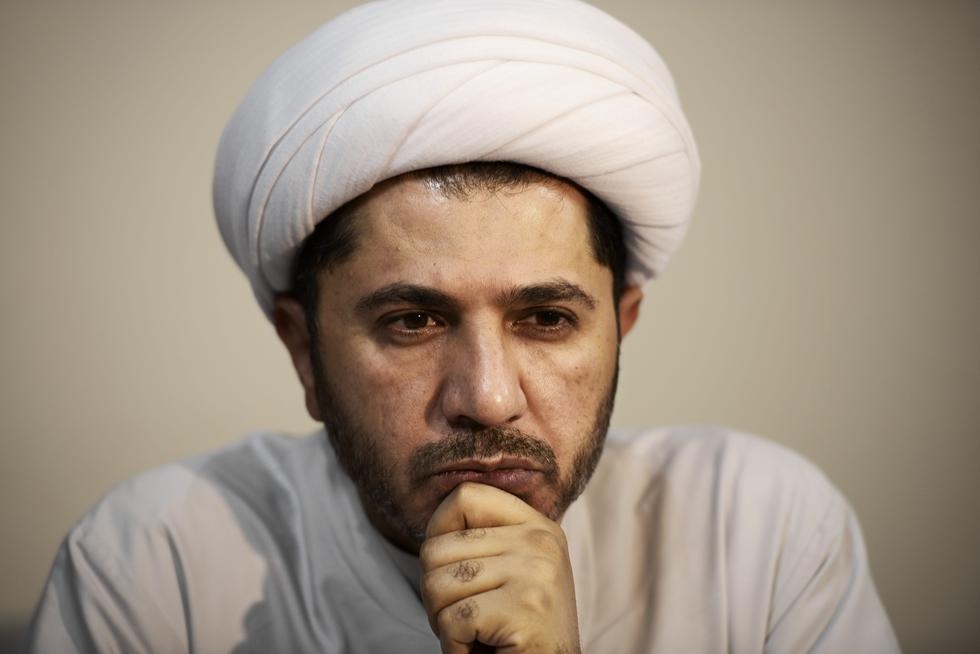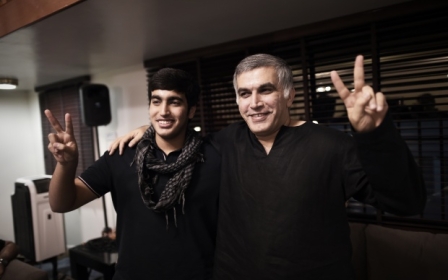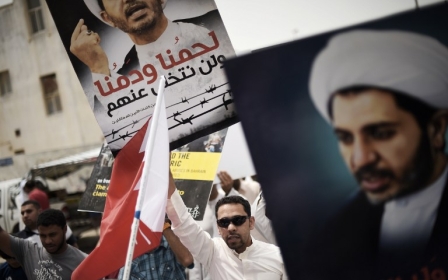My husband, prisoner of conscience in Bahrain

My husband, Sheikh Ali Salman, is the secretary general of Al-Wefaq, the largest political opposition bloc in the Kingdom of Bahrain. For peacefully critiquing our repressive government, the Higher Criminal Court recently sentenced him to four years imprisonment.
The authorities interrogated my husband for many hours before officially arresting him. He was originally summoned for questioning about “violating certain aspects of law” and was later charged with “publicly inciting hatred and insulting public institutions”.
The accusations are a little ironic, because Ali is the least hate-filled person I’ve ever known.
Over the past three decades, Ali has worked peacefully for political, social, and economic reform in our country. Though many people now know Bahrain as the site of mass uprisings since 2011, which has seen dozens killed and thousands imprisoned, the mid to late 1990s was also a period of intense revolt on our island.
The uprising lasted from 1994 to 2000. From the beginning, Ali was an outspoken voice for reform, citing government corruption, human rights violations, and authoritarianism in his public speeches as a local politician. After he called for the restoration of parliament, which the government had disbanded decades prior, the authorities arrested him amidst a widespread crackdown on 5 December 1994.
He was removed from the country just one month later, initially to Dubai before moving to London, and remained outside Bahrain for seven years.
Since returning home, Ali has continued his fight for democracy in Bahrain, ultimately becoming the leader of our largest opposition movement. Under his leadership, Al-Wefaq has fought for fair distribution of voting districts, an elected government, a transparent judiciary and accountability for crimes committed by government security forces against the Bahraini people since the crackdown in 2011.
For four years, I have watched him and members of Bahrain’s civil society struggle to provide people with legitimate, peaceful ways of voicing their opinions in the face of a regime dead-set against reform and intent on punishing those who demand it. The government routinely denies Al-Wefaq’s requests for peaceful assemblies and marches; more than once authorities have completely banned demonstrations for months at a time.
Many of our youth have become frustrated with the lack of reform, the high levels of corruption and the continuing impunity for perpetrators of state violence. When clashes have broken out between riot police and youth in our village – a weekly and sometimes nightly occurrence in Bahrain – Ali would stay awake until he heard news that no youth were injured that night. If they were, he’d be with their families within hours.
My husband is a Bahraini first and a politician second.
Many news outlets have called his prosecution an “escalation” in repressive tactics used by the regime. Amnesty International called the judgment "shocking”.
I understand why people would say this.
They used to call my husband a “red line” - a person so crucial to the stability of the country, so valued by its people, that even an authoritarian dictatorship would know better than to target him. But then again, we used to say the same of Nabeel Rajab, a prominent human rights defender now in prison, and Sheikh Isa Qasim, the country's foremost Shia cleric who has had his home attacked more than once.
There is no red line in Bahrain.
While my husband’s arrest, interrogation, detention and unjust conviction made headlines, it is not unique. For those of us living under Bahrain’s repressive government it is far from shocking.
We are witness first hand to our friends and loved ones disappearing in the night and returning home days later with torture marks on their bodies after “questioning” at the Criminal Investigations Directorate, all because they wrote a blog or walked in a peaceful march.
My husband’s conviction is, of course, an attempt by the regime to silence one of its most prominent critics. But it also mirrors the persecution endured by hundreds of outspoken politicians, journalists and human rights defenders in Bahrain.
Said Boumedouha, deputy director of the Middle East and North Africa Programme at Amnesty, said my husband’s conviction is "yet another clear example of Bahrain's flagrant disregard for its international obligations. Sheikh Ali Salman has been sentenced solely for peacefully expressing his opinion”.
This is true. And I’m sure my husband would add: “I am but one of hundreds of other Bahrainis suffering the same punishment.”
- Reema Shallan is the wife of jailed Bahraini opposition leader Sheikh Ali Salman.
The views expressed in this article belong to the author and do not necessarily reflect the editorial policy of Middle East Eye.
Photo: Bahrain's Al-Wefaq opposition group leader Sheikh Ali Salman looks on during a rally against the upcoming parliamentary election in the village of Zinj, south of Manama, November 20, 2014. (AFP)
Middle East Eye propose une couverture et une analyse indépendantes et incomparables du Moyen-Orient, de l’Afrique du Nord et d’autres régions du monde. Pour en savoir plus sur la reprise de ce contenu et les frais qui s’appliquent, veuillez remplir ce formulaire [en anglais]. Pour en savoir plus sur MEE, cliquez ici [en anglais].





